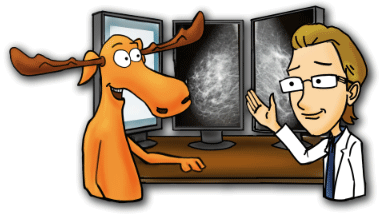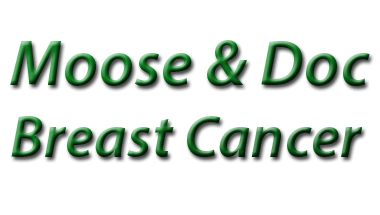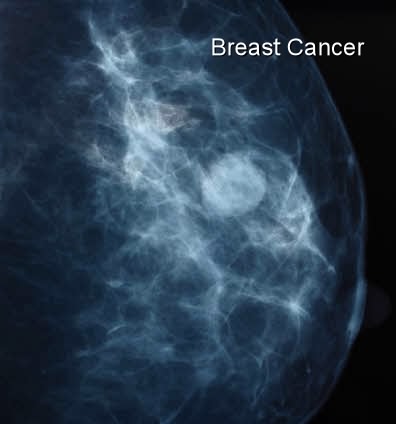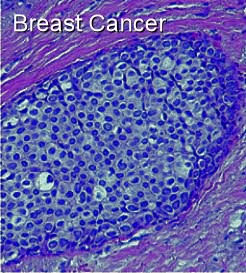

Relative Risk of Breast Cancer
The term 'relative risk', also sometimes called the 'odds ratio', and is a bit confusing to people. It is not the same as the cumulative risk of breast cancer, which, for a 40 year old woman is considered to be about 1 in 233. ( that 1 out of 233 40-year-old women will develop breast cancer later in life.) Rather, 'relative risk' compares 1 person with a risk factor, against another person who doesn't have that risk factor. Suppose a woman at age 40 has a certain risk factor that gives a 'relative risk' or RR of 2.5. That means that this woman has 2.5 times greater chance than the other woman, or developing breast cancer during her lifetime. (that is, imagine 2.5 out of 233 woman age 40 WITH this risk factor will later develop breast cancer, compared to only 1 out of 233 woman age 40 without that risk factor.)

Other factors which increase relative risk ratios for breast cancer
If a woman has had a prior diagnosis of a proliferative breast lesion, such as florid hyperplasia (without atypia) or sclerosing adenosis, the relative risk increases to between 1.6 to 2.1. Relative risk of breast cancer also increases mildly if a woman has a prior diagnosis of solitary papilloma. However, there is no increased risk for women with common breast changes such as duct ectasia or plasma cell mastitis, or fibroadenoma without degenerative changes. Similarily, there is no increased risk for with fibrosis, adenosis without sclerosis, or breast cysts.
Breast cancer risk ratio increases with atypcial hyperplasia
An 'atypical' ductal hyperplasia is generally believed to increase the relative risk ratio for breast cancer development to about 4.5 to 5. An interesting statistic to consider, however, is that the risk associated with atypical ductal hyperplasia actually decreases as a woman ages.
Relative risk of breast cancer is increased with family history
As a general trend, if there is family history of breast cancer a woman's relative risk for breast cancer increases to about 2.5. However, within the category of 'family history' there are many associated sub-categories of risk.
| Age of relative with breast cancer history | relative risk of breast cancer |
| 25 | 1:19608 |
| 30 | 1:2525 |
| 35 | 1:622 |
| 40 | 1:217 |
| 45 | 1:93 |
| 50 | 1:50 |
| 55 | 1:33 |
| 60 | 1:24 |
| 65 | 1:17 |
| 70 | 1:14 |
| 75 | 1:11 |
| 80 | 1:10 |
| 85 | 1:9 |
Familial breast cancer risk may be influenced by menopausal status,and bilatatera/unilateral breast cancer
A woman with a first degree relative who has had breast cancer is thought to have a risk of breast cancer development of about 2.3. However, that risk may be higher or lower depending upon whether the breast cancer was unilateral or bilateral, and whether the relative was premenopausal or postmenopausal. A first degree relative with postmenopausal/unilateral breast cancer increases a womans' risk very slightly to 1.2. If the breast cancer was unilateral but occurred premenopausally, the risk increases to about 1.8. But if the breast cancer in a first degree relative was bilateral and postmenopausal, the risk is about 4.0. And, if the first degree relative had bilateral/premenopausal breast cancer, a woman's risk increases quite a bit, to 8.8. The increased risk of breast cancer involving a second degree relative is very low, at about 1.5. But, if it was either a sister or mother who had breast cancer, the risk increases dramatically, to about 14.0.

Hormone replacement therapy and breast cancer risk
The issue of whether or not breast cancer risk is increased by the use of hormone replacement therapy remains controversial. Results are inconsistant and vary considerably, so no firm conclusions can be reached. However, there is some evidence to suggest that us of hormone supplementation for a longer period of time (over 5 years) can significantly increase risk of breast cancer development. According to some studies, risk of breast cancer increases by up to 40% (a 1.4 relative risk increase) following hormone replacement therapy. In particular, using a 'combination therapy' (containing both the hormones estrogen and progesterone) may significantly increase both the risk of breast cancer, and the severity. It is also suggested that breast cancer risk is highest during the first 2 to 3 years of hormone replacement therapy, but this risk decreases again about 2 years after treatments are stopped.
Breast Cancer Risk may be 'calculated'
A woman's breast cancer risk can be calculated using simple formulas, some of which are available online. One of the most widely used breast cancer risk calculators may be found at halls.md/breast/risk.htm.
References
- Tavassoli F.A, Pathology of the Breast, 1999 Page et Anderson, Diagnostic Histopathology of the Breast, (Churchill Livingstone)
- Sharabi SE, Bullocks JM, Dempsey PJ, Singletary SE. The need for breast cancer screening in women undergoing elective breast surgery: an assessment of risk and risk factors for breast cancer in young women. Aesthet Surg J.9Nov. 2010);30(6):821-31.
- Steiner (2008) Am Fam Physician 78(12): 1361-6
- Adams, Mike. Lying with statistics: How conventionalmedicine confuses the public with absolute risk vs. relative risk Journal of Clinical Oncology, (December2003),Vol 21, Issue 23: 4263-4264
- Chao C, Studts JL, Abell T, et al: Adjuvant chemotherapy for breastcancer: How presentation risk influences decision making. J Clin Oncol 21(2003): 4299–4305.
- Feuer EJ, Wun LM, Boring CC, Flanders WD, Timmel MJ, Tong, T. The lifetime risk of developing breast cancer. J Natl Cancer Inst (1993);. 85:892-7.
- Anderson, DE., Badzioch, MD. . Risk of familial breast cancer. Cancer (1985 Volume 56, Issue 2, pages 383–387,
- Colditz GA, Hankinson SE, Hunter DJ, Willett WC, Manson JE, Stampfer MJ, Hennekens C, Rosner B, Speizer FE. The use of estrogens and progestins and the risk of breast cancer in postmenopausal women. N Engl J Med. (June 1995)15;332(24):1589-93.
- Halls, SB. Detailed Breast Cancer Risk Calculator - Halls MD www.halls.md/breast/risk.htm
Back to breast cancer survival list.
End of page Navigation links: Breast Cancer home or Back to top
Copyright © 1999 - present. Steven B. Halls, MD . 1-780-608-9141 . [email protected]